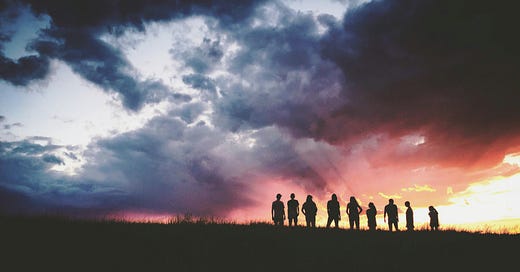professionalism and leadership
I recently reposted this piece called The Spiritual Gift of the Oregon Shooter, with some current reflections and a promise to follow up with more. The follow-up has arrived sooner than I expected: this time sparked by a post by someone on LinkedIn, a self-described Lived Experience Leader who complained about the increasing prevalence of 'trauma dumping' on that platform, and who suggested that this type of content should be handled privately in therapy.
Here's my response in the comments of that post:
I respectfully disagree. Placing human suffering in a box that is restricted to "trained professionals" is an approach that is sanctioned by neoliberalism and places artificial boundaries on where one may seek and find connection and compassion. Perhaps people suffer more when they are expected to limit their sharing to 'appropriate' spaces, which when certified as 'professional' must be paid for somehow. Trauma is a not an individual problem, it belongs to all of us in an interdependent world.
But I've been mulling this over, and want to tease out a few things.
First: what is professionalism? I really must dig out my Ivan Illich to consider this more. It's been on my mind because I'm currently in the process of setting up a private practice in coaching, and have invested in various training and qualifications to adequately prepare myself. I've learned a lot from my training, and increased my skills. However, I'm still me – bringing myself as a person into the relationship of coach and client. We don't shed our personal subjectivity – our histories, beliefs, biases, strengths, weaknesses, perspectives and social contexts – when we enter into a professional relationship with others. As much as we may formalise and regulate our actions within a professional role, we are all still individual humans bound by our individualities.
The point about neoliberalism – well really, it's more acurately a point about capitalism. We have placed all manner of human interaction into a transactional context. Just think about it: there isn't a single type of human need or interaction that hasn't been commercialised at least to some extent. Food and shelter, childcare, teaching, even intimacies like sex, medical care and compassionate care exist within a paid exchange. We talk about unpaid labour, such as childcare and housework, even more abstract concepts such as emotional labour, and we try to crowbar them into our economic formulas. So when we encounter someone's 'trauma dump' in a public sphere, we demand that they go pay for a compassionate response through professional therapy, rather than offering them the most basic response of listening and acknowledging their pain. (I'm really wrestling with this myself, because I'm now trying to create a coaching practice within this very system. I need to earn my own living, so I must charge for my time and my training and skills – as I had to invest in it myself through time, effort and money.)
Second: what is leadership? This has been on my mind a lot lately. I've always been intimidated by the idea of leadership – by the responsibility, the visibility, the possibility of 'getting it wrong' and being criticised. But I am beginning to recognise that leadership isn't necessarily a static possession to be owned and wielded. It is an organic element of relationship, for which we all have capacity. The opportunities to demonstrate leadership are everywhere, everywhen. Sometimes leadership even entails stepping aside and following someone else's lead.
Incidentally, the concept of a Lived Experience Leader is surely an oxymoron? The entire point of recognising and acknowledging lived experience is that it is available to any person, and not exclusive to a professional class. The term has become shorthand in the mental health realm for experience of extreme mental states and experience of mental health services, and knowledge/expertise of equal and even greater value than professional training. The slogan “Nothing about us without us.” captures the point, in respect to the design and provision of mental health services. In its truest sense, lived experience denotes leadership among the many, not the few. I'm reminded here of Margaret Wheatley's wonderful book, Leadership and the New Science, which posits that the most effective leadership allows for systems to self-organise naturally – as opposed to the command-and-control model which we commonly imagine of leaders. (And in all honesty: I must think about how I express what I do. I call myself a Lived Experience Activist - but am I claiming a degree of specialism that lends itself to exclusivity? I must work further with this.)
So finally: what does this suggest about the mad movement specifically, and social movements more generally – which (as suggested in the original post) are also inextricably spiritual and political. And how does it apply to myself and my role within this movement? What exactly am I working for when I invest my time and effort and skills into changing our social response to madness? Well, that is a big question. Certainly bigger than a third point examined in a couple paragraphs. Perhaps even bigger than another follow-up post.
Apologies for leaving a cliffhanger dangling here at the end of this piece. I'm just aware that I've bitten off a bit more than I can chew on this Monday morning, and I have other commitments I must attend to now. I will return to this again!
Photo by Hudson Hintze on Unsplash





